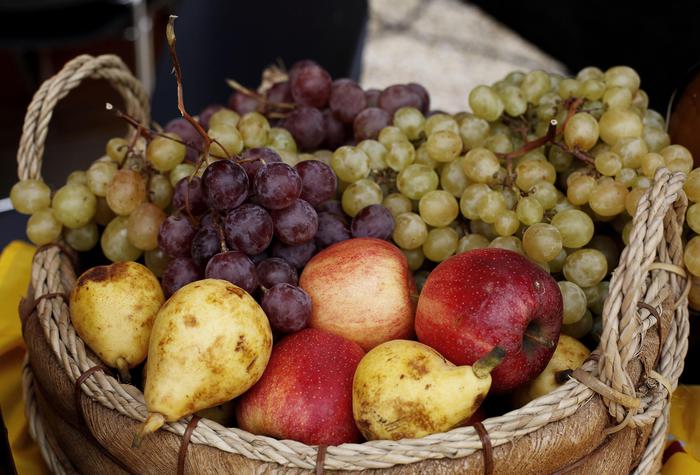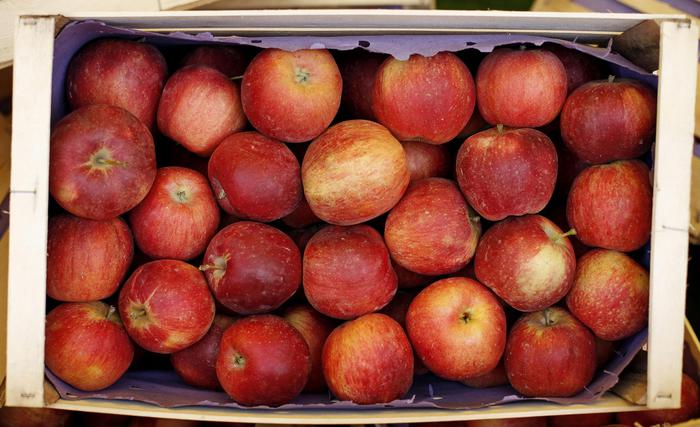Debate on reducing VAT on fruit and vegetables
Created: 04/21/2022Updated: 04/21/2022 17:21
Fruit and vegetable varieties in a Berlin supermarket.
© Wolfgang Kumm/dpa
Supermarket customers notice it at the checkout: many groceries are becoming more expensive.
Can the state cushion this and waive “its” share of the price?
Proponents point to new possibilities.
Berlin - In view of the sharp rise in food prices, the possibility of a reduction in VAT on food is also being considered.
Social and consumer organizations are calling on the federal government to use new EU rules and completely exempt certain products, such as fruit and vegetables, from taxes.
Federal Minister of Agriculture Cem Özdemir (Greens) supported the demands, but referred to the Ministry of Finance's responsibility for tax issues.
Economic researchers gave both approval and criticism.
The trade association expressed skepticism.
“Double Dividend Proposal”
"If we make fruit and vegetables cheaper, we not only relieve consumers comparatively inexpensively, but also promote healthy nutrition through the steering effect gained," Özdemir told the German Press Agency on Thursday.
"That would be a double dividend proposal, which is how I prefer it."
Due to the high inflation rate, more and more people are reaching their financial limits, said the president of the social association VdK, Verena Bentele, the dpa.
Low earners, pensioners and recipients of basic security no longer know how to pay for groceries or their electricity bills.
"The VdK therefore calls for a drastic reduction in VAT on basic foodstuffs, namely to zero percent.
The federal government must make full use of this opportunity, which is now available to all EU member states.”
In Germany, the standard rate is 19 percent.
The reduced rate of 7 percent subsidizes products that serve the common good - including staple foods such as milk, meat or baked goods.
"Contribution to climate-friendly food production"
The Federal Association of Consumers spoke out in favor of the complete abolition of VAT, especially for fruit, vegetables and legumes.
This would cushion the effects of rising prices, which is currently important for low-income households, said food consultant Christiane Seidel.
"At the same time, it would make it easier for many people to eat healthily and contribute to climate-friendly food production."
Similar demands come from the German Diabetes Society.
"Healthy nutrition shouldn't be a question of money," said Managing Director Barbara Bitzer.
The federal government must use the new legal leeway and abolish VAT for vegetables and fruit.
In return, she demanded that "the manufacturers of sugar-coated drinks" be asked to pay.
"Sugar drinks are a major driver of obesity and diabetes." Manufacturers need effective incentives to drastically reduce sugar content.
Implementation is a matter for the Ministry of Finance
According to Özdemir, a reduction in VAT on healthy food would particularly benefit those who have little or no financial leeway.
However, the Ministry of Finance is responsible for examining and implementing possible VAT changes.
Life in Germany has skyrocketed in price since the beginning of the Ukraine war, and there is no relief in consumer prices in sight for the time being.
Energy and food are becoming increasingly expensive.
According to the Federal Statistical Office, food cost 6.2 percent more in March than a year earlier.
In particular, edible fats and oils (plus 17.2 percent) and fresh vegetables (plus 14.8 percent) became more expensive.
more on the subject
Hauk: Growing more food to fight the hunger crisis
How we would buy healthier foods
Buying real estate: How much credit can I afford?
Approaching VAT could support people with low incomes in particular - since they spend a larger part of their monthly income on food than people with high incomes, as the German Institute for Economic Research (DIW) explained.
DIW President Marcel Fratzscher told the "Augsburger Allgemeine": "The federal government should temporarily abolish the reduced VAT rate of seven percent, as this would make food and other basic services cheaper and help people quickly and unbureaucratically."
Kiel Institute for the World Economy: that is not a solution
The Vice President of the Kiel Institute for the World Economy, Stefan Kooths, sees no solution in this.
Rising prices reflect greater shortages that the state cannot eliminate, he told the Rheinische Post.
"If the state wants to do something effectively against higher food prices, then it should think about freeing up agricultural land."
The trade association HDE was also critical.
Turning the VAT screw is the wrong way.
This would also benefit households that could bear the rising prices.
Instead, the federal government should increase state transfers accordingly.
dpa









